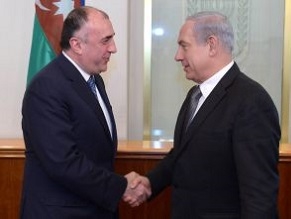|
Analytics

Israeli Prime Minister Benjamin Netanyahu shakes hands with Azerbaijan Foreign Minister Elmar Mammadyarov (Photo by Amos Ben Gershom GPO via Getty Images)
|
Israel Less Isolated Thanks to Cultivation of Interfaith Ties
14.08.2019, Israel and the World With Israeli Prime Minister Benjamin Netanyahu recently becoming the longest-serving premier in his country’s history, and with Israel’s second national election in one year set for September, the incumbent leader’s legacy continues to be the source of abundant debate.
Netanyahu and his supporters claim that in his 13 years in office, the Jewish state has never been safer or more globally accepted. Is that a fair assessment?
Putting aside for a moment issues like the status of the Israeli-Palestinian conflict, it is indeed difficult to diminish Netanyahu’s stewardship of burgeoning relationships with leaders in Africa, Latin America, the Far East and, most strikingly, moderate Arab and Muslim states.
For starters, Netanyahu enjoyed the benefit of inheriting peace with neighboring Egypt and Jordan.
Since Israel and Jordan signed a peace treaty in 1994, the countries’ strategic relationship has been expressed mainly in the national security realm. A stable Jordan prevents the establishment of a hostile regime or chaos along Israel’s longest border. Relations with Israel enable Jordan to effectively address regional and internal threats.
The Egypt-Israel peace treaty, signed in 1979, established diplomatic, economic and cultural ties that have stood the test of time. Earlier this year, it was revealed that Egypt and Israel were working together to fight Muslim extremism, including carrying out some joint military exercises.
But Netanyahu has gone above and beyond. Last October, he was welcomed to Oman by longtime ruler Sultan Qaboos bin Said. Netanyahu has vocally expressed his intentions to build on that momentum by solidifying ties with similar states, including Bahrain. Also, in October 2018, at a Grand Slam judo tournament in Abu Dhabi, Israel’s national anthem was played for the first time in the Arabian peninsula after an Israeli competitor won a gold medal.
Netanyahu can now add strategically important Muslim-majority nations in Africa to his list of new friends, including Guinea, Chad and Mali. In restoring relations, those countries ended a collective 147 years of diplomatic hostility toward Israel.
Moreover, Israel’s relations with Gulf countries like the United Arab Emirates and Saudi Arabia have warmed as part of a tacit alliance against the threats posed by Iran.
Lesser known is that Netanyahu has also made efforts to improve relations with Iraq. Last month, Iraq beauty queen Sarah Idan passionately defended Israel while addressing the U.N. Human Rights Council.
Yet even before these budding relationships, Israel had other Muslim-majority friends outside the Middle East, namely Azerbaijan in Eurasia and Kazakhstan in Central Asia. With their alliances with Israel each beginning in 1992, those nations were the true pioneers in the history of Jewish-Muslim ties.
Azerbaijan in particular represents the shining example of Israel’s growing success with Muslim states, as Netanyahu himself has lauded Israeli-Azerbaijani ties as “something that we can show the world.”
The military-technical partnership between Israel and Azerbaijan is continuously developing and strengthening. Azerbaijan was the third-largest purchaser of Israeli arms in 2017 ($137 million), according to the Stockholm International Peace Research Institute. During a 2016 visit by Netanyahu, Azerbaijan’s president revealed that the Muslim-majority country had purchased $5 billion worth of Israeli weapons over time.
But the Israel-Azerbaijan relationship goes beyond security, to the people. There is a long, fraternal friendship between Azerbaijanis and the Jewish community living in their country, where Jewish and Israeli visitors as well as diplomats have reported that there is no anti-Semitism and that Jews are treated not like foreigners but friends. Azerbaijan’s Jewish community has lived there for more than 2,600 years with no reported harassment, insults, pogroms or other hateful actions.
Aligning with his broader outreach to Muslim states, Netanyahu took Israel’s already-stalwart ties with Azerbaijan and grew them to new heights. Simultaneously, the Jewish state’s increasingly warm outlook among faith communities is not limited to the Muslim world. The groundswell of evangelical Christian support for Israel continues to build, with over two-thirds of evangelicals holding positive perceptions of the country.
The diversity of Israel’s enhanced global alliances extends even further, to Japan, whose prime minister visited Israel in January in the first such trip by a Japanese premier in over a decade; China, whose relationship with Israel has rapidly expanded in recent years in trade, investment, education, exchanges and tourism; and India, which on several recent occasions has abandoned its pattern of voting with Arab states against Israel at the U.N.
Regardless of the outcome of Israel’s election in September, the country is less isolated than ever, thanks in part to the inspirational story of its growing ties with Muslim states. Netanyahu faces an uncertain future, but his strong cultivation of interfaith ties is at least one reason to have faith in his legacy.
By Maayan Jaffe-Hoffman
Maayan Hoffman is news editor and head of online content and strategy at The Jerusalem Post. She has been an American-Israeli international journalist for more than two decades.
CNSNews
|
|
